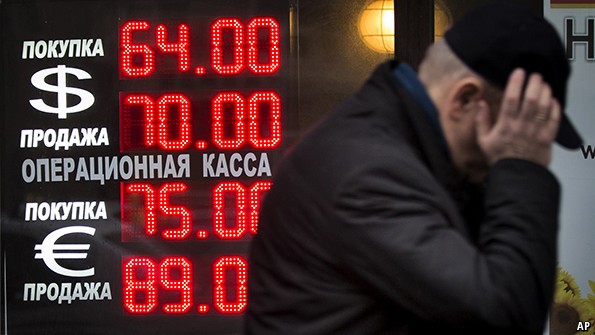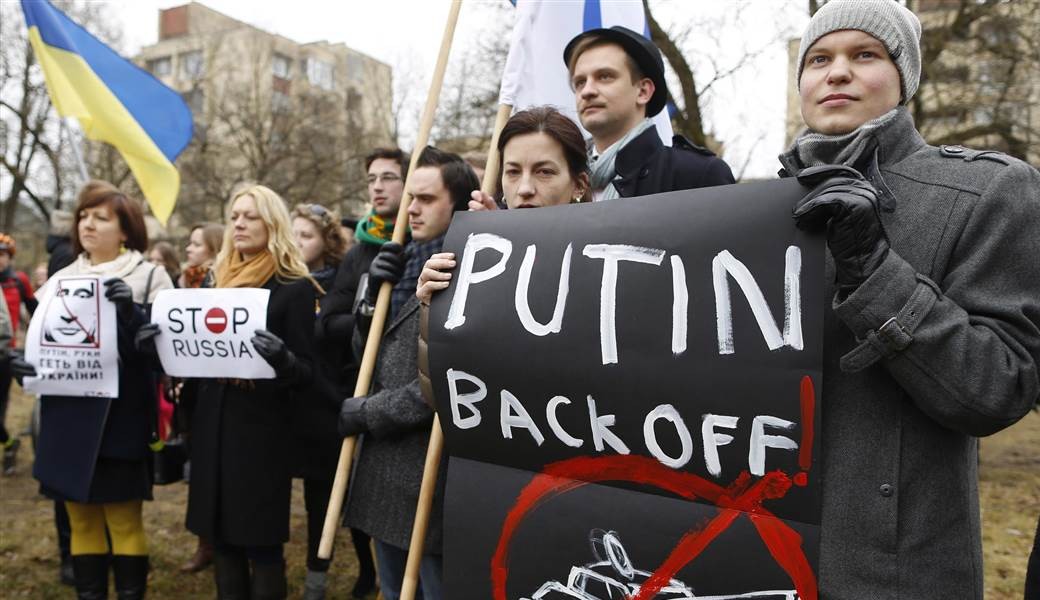Storm is coming Russians still fear crisis
Post on: 16 Март, 2015 No Comment

As Russia’s economy continues to struggle amid swingeing sanctions, oil price declines, a weak ruble and rampant inflation, ordinary Russians are feeling the pinch – with some believing the crisis hasn’t even started yet.
Russia’s economy has been hit hard by the severe decline in global oil prices and sanctions imposed on the country for its part in the Ukraine conflict. This, in turn, has caused the currency to weaken 90 percent against the dollar over the last 12 months, further pushing up the rate of inflation which stands around 11.4 percent.
To top it all off, Russia’s economy is expected to enter recession this year, but one Moscow-based economist told CNBC that the crisis hadn’t even started yet.
Sasha Mordovets | Getty Images
We are on the edge of crisis, we’re close but we’re not yet there, Vladimir Tikhomirov, chief economist at Russian financial services firm BCS Financial Group, told CNBC.
I can say that we have not yet seen the full effect of the economic crisis – redundancies, closing businesses, rising non-performing loans – we haven’t seen those things yet but that’s not to say it’s not coming, he warned.
This is the calm before the storm, we know the storm is coming it just depends on how severe it is.
Russia’s economy has undergone a radical tranformation from the days when it was a jewel among emerging markets. In 2015, the economy could shrink by as much as 5.5 percent, however, according to ratings agency Moody’s, a far cry from the 5.6 percent growth seen back in 2008.
Rise in criminality?
Against such a backdrop of shrinking growth, Russian businesses are nervous, Tikhomirov warned, although he said that they were largely powerless to change both external factors – such as the oil price decline or global slowdown — and internal factors such as President Vladimir Putin.
The business world is worried and concerned. It’s a very challenging situation to put it mildly but a lot of the risks are not in the economy are in politics and geo-politics and that has an effect on the prospects of doing business in Russia.
Generally, the business sector cannot do much about that — there’s not much influence they can have on politicians, he said.
Self-employed Stanislav Sergeev, who works with start-ups in Moscow and St Petersburg, says he currently has no work now and that he and other business owners are worried.
I can tell you about atmosphere and mood in Moscow and Saint-Petersburg and yes, we worry about all these things. Some of my friends who are owners of businesses have started to reduce the amount of employers by 50 percent and to reduce their income by 70 percent, Sergeev told CNBC Thursday.
He said that Russians were having to spend more of their money because of the devaluation in the ruble and warned that as the domestic market starts to collapse, and as more people become unemployed, Therefore we expect a rise in criminality.
'Stupid management'
Russia’s leaders have been keen to absolve themselves of responsibility for the economic crisis, blaming the decline in oil and external factors, as Putin called them, for the crisis. That Russia needs to change is already recognised by the country’s government, however.

Russia’s Finance Minister Anton Siluanov told CNBC last week that reforms were desperately needed in order for Russia to recover, recognizing himself that the country was in dire straits economically.
This situation is not the result of (economic) sanctions but the result of the stupid management during 20 past years, Sergeev told CNBC,
Economist Tikhomirov added that commodity-dependent Russian economy needed to change in order for it not to be held hostage to fluctuations in the oil price which has fallen by around 50 percent since June last year.
He added that reforms designed to move Russia away from its reliance on oil were also slow moving. Reforms are spoken of but little is done…Today Russia has a developed financial sector, automotive sector and these are sectors that have seen progress but the economy is still largely commodity driven and this needs to change.
The depth of the crisis depended on two factors, Tikhomirov said: whether the oil price recovers and whether there was a peaceful solution to Ukraine conflict.
Russia has had sanctions imposed on its economy for almost a year by the west for its incursions into Ukraine, which have added to its economic downturn.
Global stock markets advanced Thursday on news of cease-fire deal between Russia and Ukraine following months of escalating violence between pro-Russian rebels and the Ukraine military.
Speaking on Russian TV, Putin said the agreement would mean the removal of heavy weapons and a full cease-fire from midnight on February 15. However, given that a previous cease-fire has failed, analysts questioned how long this deal would last.
Sergeev summed the attitude of him and his friends, telling CNBC: We hope that everybody switches on their brains and this situation returns to one of partnership (between Ukraine and Russia).
However, Ukraine’s rebels disavowed a new truce on Sunday, Reuters reported, hours after it took effect, saying it did not apply to the town where most fighting has taken place in recent weeks.














